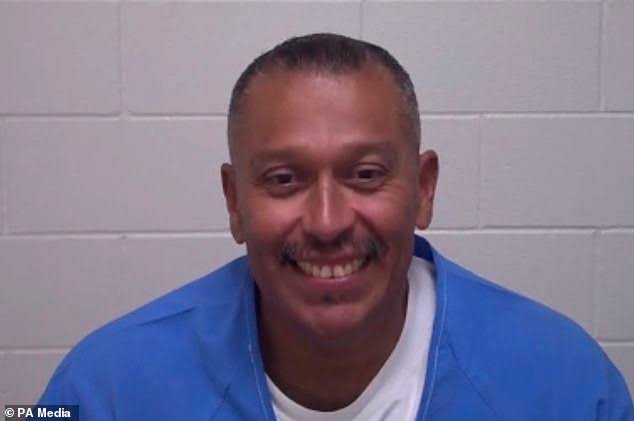A California man wrongly convicted of a drive-by killing of an 82-year-old woman has finally been released after nearly 25 years in prison.
M Solorio, 44, was arrested in 1998 for a fatal drive-by shooting in Whittier, south east of Los Angeles, and sentenced to life without the possibility of parole.
He maintained his innocence regardless
Solorio maintained his innocence, arguing he had been with his girlfriend and sister the day Maryann Bramlett was shot and killed.
And with new evidence and witnesses supporting Solorio’s testimony, his ‘dream team’ lawyers were able to successfully argue that his brother was the gunman.
The attorneys who petitioned for Mr Solorio’s release argued that his conviction was based on faulty eyewitness identification practices.
Victim Impact statement
In a long-awaited reversal, Superior Judge William Ryan overturned the conviction during an LA hearing that Mr Solorio attended remotely on Thursday.

‘This nightmare started when I was 19 years old. I’m now 44. This was going to be my Christmas in prison. Being home this year will be the best present ever,’ Solorio said in a statement provided by the Northern California Innocence Project.
In a letter last month, the Los Angeles District Attorney’s Office said it had ‘confidently and definitively’ concluded that Mr Solorio is entitled to be released.
His attorneys said the case relied heavily on a now-debunked method of identifying a suspect that results in contaminating the witnesses’ memory by repeatedly showing photos of the same person over and over.
How his innocence overturned court judgement
In Mr Solorio’s case, before it was in the news, four witnesses shown his photo did not identify him as the suspect, and some even pointed to a different person.
But rather than pursue other leads, law enforcement continued to present the witnesses with photos of Mr Solorio until some of them eventually identified him, his lawyers said.
‘This case is a tragic example of what happens when law enforcement officials develop tunnel vision in their pursuit of a suspect,’ said Sarah Pace, an attorney with the Northern California Innocence Project at Santa Clara University School of Law.
‘Once a witness mentioned Solorio’s name, law enforcement officers zeroed in on only him, disregarding other evidence and possible suspects, and putting their own judgment about guilt or innocence above the facts.’
The district attorney’s letter noted that ‘new documentable scientific consensus emerged in 2020 that a witness’s memory for a suspect should be tested only once, as even the test itself contaminates the witness’s memory.’
What court filings reveal
Court filings indicate that Miguel Solorio had been in touch with his brother, Pedro Solorio, multiple times since his conviction.
In 2007, records showed, Pedro wrote to his brother in prison, saying Miguel had been ‘falsely accused of doing something [Miguel] had no knowledge of’.
He wrote that he was considering coming forward to ‘step up to the plate and make things right’.
In 2011, Pedro wrote to Miguel again and said he was planning to get a lawyer to ‘make a deal for myself’.
Miguel’s lawyers say Pedro never did go through with his promises.
Records from the federal Bureau of Prisons showed Pedro had been released from federal prison in February 2021.












